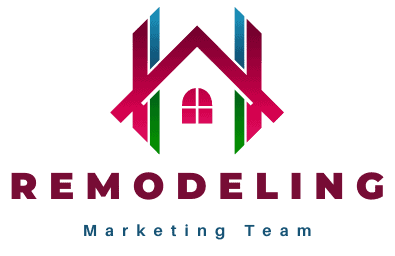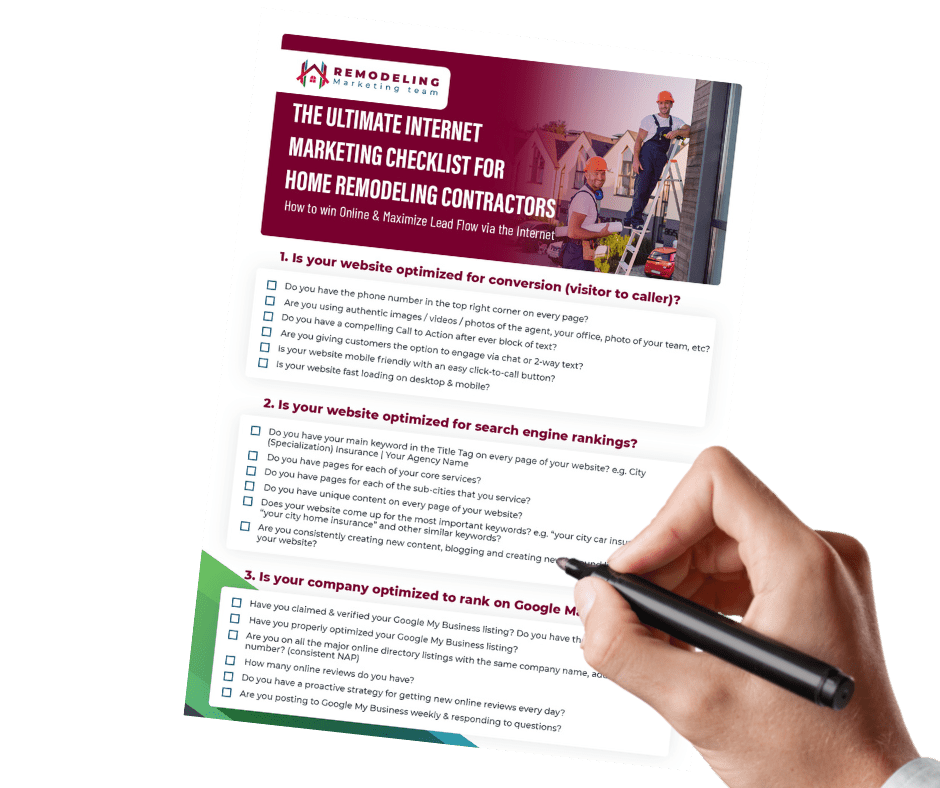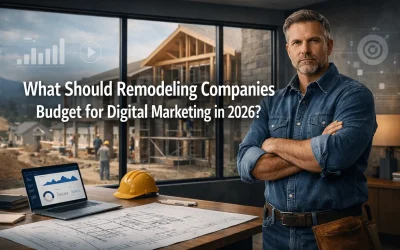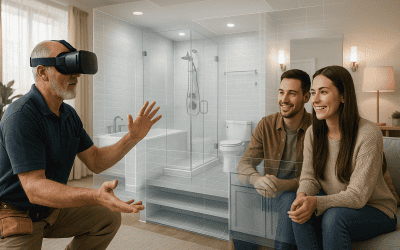Imagine a world where Google isn’t the default answer to every question. As antitrust rulings shake up the search landscape and AI-driven platforms gain ground, the future of online search is poised for dramatic change. These shifts will impact users and small businesses alike, creating both challenges and opportunities. For home remodeling and residential building contractors who rely on search visibility to connect with customers, these changes could bring new ways to engage clients beyond Google’s ad-dominated approach. Let’s explore these developments in online search, the power of AI, and how they will impact your business’s SEO and online visibility in the coming years.
Key Takeaways
- Antitrust Rulings Challenge Google’s Dominance
Recent antitrust cases against Google aim to reduce its monopoly in online search, potentially opening the market to new competitors. This shift could reshape how contractors and other small businesses engage with search platforms to reach their audiences.
- AI-Powered Platforms Are Transforming Search
Emerging AI-driven platforms like Perplexity.ai and SearchGPT are changing the way users search for information, offering direct, context-rich answers rather than traditional lists of links. These platforms use advanced AI to interpret complex queries, enhancing the search experience.
- Implications for SEO and Online Visibility
With AI-driven search on the rise, contractors will need to adapt their SEO strategies by focusing on high-quality, informative content that directly answers users’ specific questions. Building a strong, consistent online presence across multiple platforms will be essential to maintaining visibility in an AI-powered search environment.
- Voice and Conversational Search Are Growing in Importance
As voice and conversational search become more popular, contractors should adapt their content to reflect natural, spoken language. This will help capture more traffic from users relying on voice-enabled searches, especially as AI platforms increasingly focus on direct answers to user queries.
- Building Trust Through Social Proof and Reviews
Positive reviews and an active online presence on sites like Yelp and Houzz are now more critical than ever. AI-powered search platforms pull data from multiple sources, and favorable reviews can boost credibility and increase the likelihood of being featured in search responses.
- Opportunity to Diversify Marketing Strategies
As new AI-powered platforms gain traction, contractors can benefit from a more diversified approach to online visibility. Embracing these new platforms can reduce reliance on Google’s ad system, helping contractors reach potential clients through varied and emerging channels.
I. Antitrust Cases Against Google
A. Overview of Legal Proceedings
In 2020, the U.S. Department of Justice (DOJ) filed a landmark lawsuit against Google, accusing it of monopolizing online search. For years, Google’s dominance in online search, supported by powerful ad systems and algorithms, made it the primary option for users and advertisers. In 2024, Judge Amit Mehta ruled that Google’s practices constituted a monopoly, confirming years of complaints from competitors and signaling potential changes in how search could operate in the future.
B. Potential Remedies and Implications
Proposed remedies in court include breaking up parts of Google’s business and limiting agreements that make it the default search engine on devices like iPhones and Androids. If enacted, these changes could shift the entire search landscape, creating space for other platforms to thrive. For remodeling contractors, this could mean more accessible advertising options and new ways to be found by potential clients, without always competing for Google’s limited ad space.
II. Emergence of AI-Powered Search Platforms
A. Introduction to AI Search Technologies
Unlike traditional search engines, which focus on ranking webpages by relevance to keywords, AI-powered search platforms learn from vast data and offer contextually rich answers. These platforms use natural language processing (NLP) and machine learning to interpret complex queries, delivering responses that are more specific, relevant, and easy to understand. AI-driven search doesn’t just provide links; it offers direct solutions and insights, transforming how users interact with search engines.
B. Notable AI Search Platforms
- Perplexity.ai
- Perplexity.ai is an AI-driven search platform that has quickly gained attention, recently reaching a valuation of $9 billion. Known for its conversational style, Perplexity.ai uses NLP to answer complex questions with clarity and context. This makes it an ideal fit for home remodeling contractors whose clients may have detailed questions about project options or costs. For instance, a client might ask, “What are the pros and cons of vinyl vs. tile flooring?” and get a comprehensive answer without wading through multiple links.
- SearchGPT by OpenAI
- SearchGPT, developed by OpenAI and integrated with the ChatGPT platform, takes AI-driven search further by offering detailed insights and explanations in response to user queries. This tool is particularly useful for questions that require depth, such as remodeling budget advice or planning a kitchen layout, helping users move from curiosity to action quickly. SearchGPT could be a valuable asset for contractors who want to reach clients earlier in the decision-making process.
III. Intersection of Antitrust Rulings and AI Search Platforms
A. Impact on Market Competition
If antitrust rulings succeed in curbing Google’s dominance, AI-powered platforms like Perplexity.ai and SearchGPT could see wider adoption, fostering a more competitive environment in online search. For contractors, these alternative platforms can create new channels for connecting with customers outside of Google’s tightly controlled ecosystem. Over time, this could lead to more diverse search experiences for users and less reliance on paid ads for small businesses.
B. Challenges and Opportunities for New Entrants
While AI-powered platforms offer exciting possibilities, they face challenges too. AI models require enormous amounts of data to function effectively and must navigate complex privacy and data protection laws. Additionally, building trust among users accustomed to Google will take time. As these platforms evolve, however, contractors could find new ways to showcase their expertise and connect with clients who seek precise, contextually relevant answers for their remodeling needs.
IV. Future Impact on SEO and Online Visibility
As AI-driven platforms reshape search, they will also influence how contractors approach SEO and online visibility strategies.
A. The Evolution of SEO in an AI-Driven Search Landscape
In a world dominated by AI-powered search, SEO strategies will need to evolve. Instead of relying solely on keywords and backlinks, contractors may need to focus more on providing high-quality, informative content that directly answers the complex questions potential clients might ask. For instance, instead of a blog post titled “Kitchen Remodeling Ideas,” a contractor might focus on “Cost Breakdown for Small Kitchen Remodels” or “Step-by-Step Guide to Eco-Friendly Home Renovations.”
The goal will be to create comprehensive, well-structured answers that AI models can pull from, making contractors’ content more likely to appear in conversational responses. This approach shifts SEO from simply “optimizing for Google” to optimizing for the needs of AI search engines that prioritize depth, clarity, and relevance.
B. Building an Online Presence Across Platforms
As AI engines become more capable of pulling information from diverse sources beyond just websites, contractors will need to focus on building a digital footprint across multiple platforms. This includes maintaining a consistent, professional presence on social media platforms like LinkedIn, Facebook, and industry-specific forums. AI search engines may soon consider a contractor’s online activity, social presence, and reviews on sites like Yelp or Houzz as factors when delivering search results. The broader and more comprehensive the footprint, the better the chance a contractor’s information will be included in relevant AI-driven search results.
C. Emphasis on User-Centric Content and Expertise
User-focused, expert-driven content is set to become central to SEO. As AI-powered search tools favor direct answers and expert opinions, contractors who establish themselves as thought leaders or trustworthy resources in remodeling will stand out. This means producing content that addresses specific remodeling concerns, common challenges, or frequently asked questions with transparency and authority. If a homeowner asks, “How long does a typical bathroom remodel take?” an AI platform that sees your site as an authoritative source may provide that information directly from your site, giving you visibility even without a traditional top-ranking spot.
D. Reviews and Social Proof
Online reviews and testimonials are already important for building trust, but they will play an even greater role as AI-powered search engines pull data from various sources. Contractors should actively seek reviews from satisfied clients and ensure their presence on review-based platforms. Positive reviews on Google, Yelp, or Houzz will be even more crucial for visibility, as AI models use this social proof to determine credibility and relevance. Reviews will likely influence how AI-powered search platforms rank or recommend contractors in user responses.
E. Adapting to Voice and Conversational Search
With AI platforms enabling more conversational and voice-based searches, contractors may need to consider how clients phrase spoken questions versus typed ones. As voice search becomes more common, content should reflect the natural language people use when speaking. Creating FAQ sections or blog posts that answer specific, conversational queries like “What’s the timeline for a deck installation in summer?” will help contractors capture traffic from these new search formats. Adapting SEO strategies to suit voice search patterns can ensure a contractor’s content is well-positioned for these more intuitive queries.
V. Future Outlook for Online Search
A. Evolution of User Experience
As AI integration progresses, user experiences with search engines are likely to become smoother and more personalized. Instead of endless lists of links, users may get rich, conversational responses that bring clarity and immediate insight. For example, a homeowner searching “best kitchen layout for small spaces” might receive a layout recommendation, design tips, and cost estimates, all without needing to visit multiple sites. For contractors, this shift could mean increased visibility for niche expertise and unique project solutions.
B. Regulatory Landscape
AI-powered platforms will come under closer scrutiny as they grow in popularity. Governments worldwide are taking a closer look at how these technologies are used, what data they collect, and how they impact consumer rights. New regulations could alter how contractors interact with these platforms, possibly affecting ad placements or limiting the data they can access about users.
C. Strategic Responses from Established Players
To stay competitive, Google has already launched its Gemini AI model, an upgrade that includes real-time data processing, multi-step reasoning, and advanced planning capabilities. Gemini’s enhancements aim to keep Google users engaged by offering immediate, customized responses for complex questions. For contractors, these advancements could bring new tools for reaching clients with more targeted, relevant ads, but they may also add complexity to the already competitive search landscape.
Conclusion and Next Steps
The future of online search is evolving rapidly, driven by both legal changes and technological advances. Antitrust actions against Google aim to encourage competition, while AI-powered platforms offer innovative alternatives that can change how users find information. For home remodeling and residential contractors, these shifts present an opportunity to connect with customers in new and meaningful ways, using platforms that emphasize context and conversation rather than keywords and rankings.
To adapt successfully, contractors will need to embrace a more flexible SEO approach, focusing on creating high-quality, useful content, building a broad online presence, and engaging with clients authentically across platforms. Navigating these changes may seem complex, but the potential rewards are significant.
Are you ready to future-proof your online presence? If you want to position your business for success in this evolving landscape, we invite you to schedule a strategy session with the Remodeling Marketing Team. During this session, our experts will review your current online presence, identify new opportunities, and develop a customized strategy to help you stay ahead in the AI-driven search era.
Visit Remodeling Marketing Team to schedule your free strategy session today, and let us help you maximize your visibility in this new age of search.
The information presented in this blog post is derived from various reputable sources, including:
- “Judge Rules on US DOJ v. Google Antitrust Search Suit,” The Verge, August 5, 2024.
- “Google Search Antitrust Case,” AP News, August 5, 2024.
- “Perplexity Raising New Funds at $9 Billion Valuation, Source Says,” Reuters, November 6, 2024.
- “OpenAI Takes on Google with ChatGPT Search Engine SearchGPT,” New York Post, November 1, 2024.
FAQs
What are the recent antitrust rulings against Google, and why do they matter for contractors?
The U.S. Department of Justice filed a lawsuit against Google in 2020, claiming it monopolizes the online search market. In 2024, a judge ruled that Google’s practices constituted a monopoly. This decision could lead to changes that create a more level playing field for alternative search platforms. For contractors, this means potential new ways to reach clients without solely relying on Google’s advertising and ranking systems.
How are AI-powered search platforms like Perplexity.ai and SearchGPT different from traditional search engines?
AI-powered search platforms, such as Perplexity.ai and SearchGPT, focus on providing direct, context-rich answers rather than long lists of links. They use advanced AI and natural language processing to understand complex queries and respond with clear, comprehensive answers. This technology offers users more personalized search results, which could create new opportunities for contractors to reach clients searching for specific remodeling advice or information.
How will these changes impact SEO strategies for contractors?
As AI-driven search engines become more popular, traditional SEO strategies like keyword optimization may be less effective. Contractors will need to prioritize high-quality, informative content that answers specific client questions and showcases expertise. Building a broad online presence across multiple platforms, along with producing content that AI platforms recognize as authoritative, will be key for maintaining visibility.
Why are online reviews and social proof more important in an AI-driven search landscape?
AI-powered search engines pull information from multiple sources, including reviews and social proof from platforms like Yelp, Google Reviews, and Houzz. Positive reviews help establish credibility and trust, which are crucial for AI algorithms that prioritize reputable sources. Having strong reviews and a good reputation across these platforms can increase a contractor’s visibility in AI-powered search results.
How should contractors adapt to the rise of voice and conversational search?
With more users relying on voice search, contractors should ensure their content reflects natural, conversational language. FAQs, blog posts, and answers to specific questions should be phrased in ways that mirror how people speak, such as “How long does a bathroom remodel take?” Adapting content for voice search will help contractors capture more traffic from clients who use voice-enabled devices.
What are the advantages of diversifying online visibility across different search platforms?
With new AI-powered search options emerging, contractors can reach clients through a broader range of platforms. This reduces reliance on Google’s ad-heavy approach and offers contractors more opportunities to be visible in contextually relevant search results. By embracing a diversified strategy, contractors can engage clients in ways that align with evolving digital trends.
How can I start adapting my marketing approach to align with these changes?
Consider scheduling a strategy session with a marketing expert to assess your current online presence and SEO strategies. The Remodeling Marketing Team offers sessions that review your digital footprint, identify opportunities for improvement, and develop a tailored plan to enhance your visibility on both traditional and AI-driven search platforms.
What are some key online platforms where contractors should establish a presence?
In addition to maintaining a website, contractors should be active on platforms like Yelp, Houzz, Facebook, and LinkedIn, where client reviews and social proof are valuable. A comprehensive presence on these sites helps AI algorithms recognize the business’s authority and credibility, increasing the likelihood of being included in AI-driven search results.
This article is a collaboration between Carl Willis and OpenAI’s ChatGPT. Created on November 6, 2024, it combines AI-generated draft material with Willis’s expert revision and oversight, ensuring accuracy and relevance while addressing any AI limitations.






